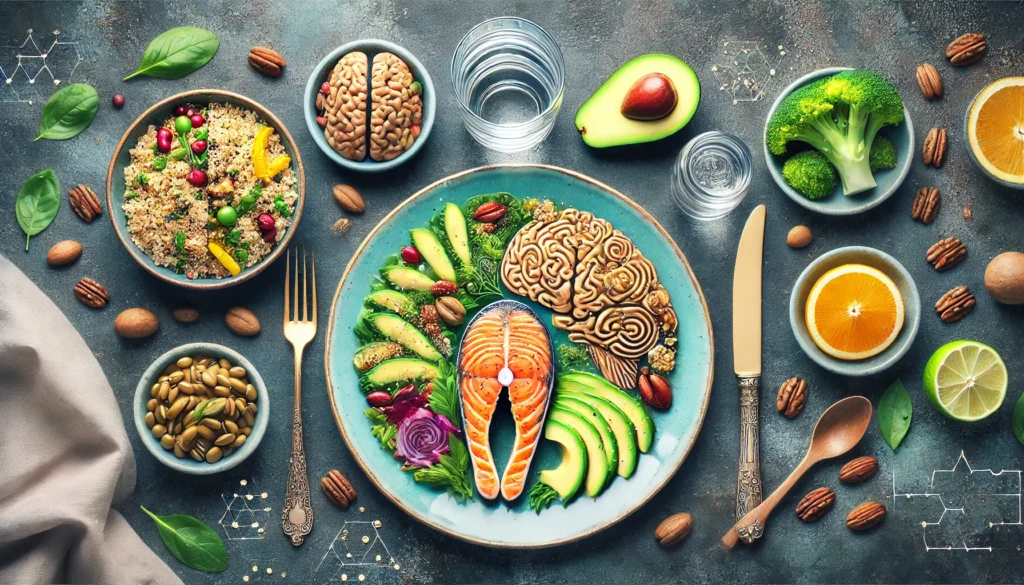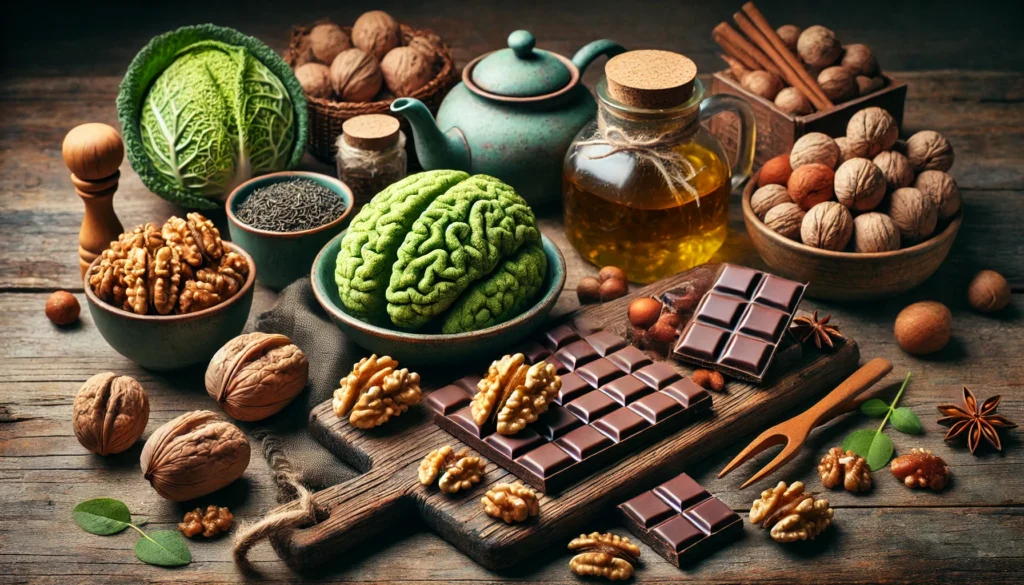A vibrant mind is the cornerstone of a thriving life, enabling us to navigate daily challenges with grace and acuity. In the quest for cognitive vitality, nutrition plays a pivotal role. While there’s no magic bullet for brain health, certain foods have been shown to support memory, concentration, and overall brain function. This article delves into the top 10 brain foods that can enhance memory and cognitive performance, illuminating how dietary choices can profoundly impact mental clarity and focus.
You may also like: Memory-Boosting Foods You Should Try Today
The Science Behind Brain Foods
Before we explore specific foods, it’s essential to understand why diet impacts brain function. The brain, an organ of immense complexity, requires a continuous supply of nutrients to function optimally. Glucose, derived from carbohydrates, serves as its primary energy source, while antioxidants, fatty acids, and amino acids protect and support neuronal health. Therefore, a balanced diet rich in these nutrients can significantly bolster cognitive function and memory.
Nutritional Needs of the Brain
The brain’s demand for energy is unparalleled, accounting for about 20% of the body’s total energy expenditure. Carbohydrates, when broken down into glucose, fuel the brain’s activities. A steady supply of glucose ensures that cognitive processes, such as memory and problem-solving, are performed efficiently.
The Role of Antioxidants
Antioxidants combat oxidative stress, a state where free radicals damage cells, including neurons. This damage can lead to neurodegenerative diseases. Foods rich in antioxidants, such as blueberries, help neutralize these free radicals, protecting the brain from potential harm.
Fatty Acids and Brain Health
Fatty acids, particularly omega-3s, are integral to maintaining the structure and fluidity of cell membranes. This fluidity facilitates the transmission of signals between neurons, which is essential for learning and memory. The brain’s ability to adapt and change (neuroplasticity) relies heavily on these processes.
Amino Acids and Neurotransmitter Production
Amino acids, the building blocks of proteins, play a critical role in the production of neurotransmitters. These chemical messengers are vital for communication between brain cells. For instance, serotonin, derived from the amino acid tryptophan, is crucial for mood regulation.
Fatty Fish
Fatty fish, such as salmon, trout, and sardines, are renowned as some of the best foods for cognitive function. Rich in omega-3 fatty acids, these fish support brain structure and enhance synaptic plasticity, crucial for learning and memory. Omega-3s also reduce inflammation, which can impede cognitive processes.
Why Is Fish Good Brain Food?
Omega-3s are integral components of cell membranes, especially in the brain, making them indispensable for brain development and repair. Regular consumption of fatty fish has been linked to a reduction in mental decline and a lower risk of Alzheimer’s disease. These fatty acids also promote better blood flow in the brain, ensuring that neurons receive adequate nutrients and oxygen.
Impact on Mental Health
Omega-3s are not just about structural benefits; they are also linked to mental health. Studies have shown that individuals with higher omega-3 intake have lower rates of depression. This is because omega-3s can influence serotonin and dopamine production, neurotransmitters that regulate mood.
Sustainable Choices in Seafood
While incorporating fatty fish into your diet, it’s essential to consider sustainability. Opt for wild-caught or responsibly farmed fish to ensure environmental balance. Overfishing and habitat destruction are significant concerns, and making informed choices can help protect marine ecosystems.
Blueberries
Blueberries stand out among fruits for brain health due to their high levels of antioxidants. These compounds, including anthocyanins, combat oxidative stress and inflammation, which are implicated in neurodegeneration. Studies suggest that blueberries may improve memory and delay short-term memory loss.
The Power of Anthocyanins
Anthocyanins are potent antioxidants that give blueberries their deep blue color. These compounds have been shown to cross the blood-brain barrier, directly impacting brain regions involved in memory and learning. By reducing oxidative stress, anthocyanins help preserve cognitive function.
Memory and Learning Enhancement
Research indicates that regular consumption of blueberries can enhance memory and learning. In animal studies, diets rich in blueberries have improved performance in memory tasks. Human studies have also shown promising results, with participants experiencing better recall and cognitive function after consuming blueberry supplements.
Blueberries in Your Diet
Integrating blueberries into your diet can be both delicious and beneficial. Add them to smoothies, sprinkle them on cereal, or enjoy them as a snack. Frozen blueberries retain their nutritional value, making them a convenient option year-round.
Turmeric
Turmeric, with its active compound curcumin, is a potent anti-inflammatory and antioxidant. It has been shown to cross the blood-brain barrier, potentially enhancing mood and memory. Some research indicates that curcumin may help in the growth of new brain cells, a process known as neurogenesis.
Historical Context of Turmeric
Used in Ayurvedic medicine for centuries, turmeric’s cognitive benefits are now supported by modern science. Its role in reducing neuroinflammation makes it a promising candidate for cognitive health. The spice has been traditionally used to treat various ailments, including respiratory issues and joint pain.
Curcumin’s Mechanisms of Action
Curcumin impacts brain health through several mechanisms. It reduces inflammation by inhibiting enzymes that produce pro-inflammatory chemicals. Additionally, curcumin boosts levels of brain-derived neurotrophic factor (BDNF), a protein linked to memory and learning. Higher BDNF levels are associated with improved mental clarity.

Incorporating Turmeric in Meals
Turmeric’s versatility makes it easy to add to various dishes. Use it in curries, soups, or as a seasoning for roasted vegetables. Combining turmeric with black pepper enhances the absorption of curcumin, maximizing its benefits.
Broccoli
A cruciferous vegetable, broccoli is packed with antioxidants and vitamin K, essential for forming sphingolipids, a type of fat densely packed in brain cells. It also contains compounds with anti-inflammatory effects, supporting overall brain health.
Vitamin K and Brain Function
Vitamin K plays a crucial role in the synthesis of sphingolipids, which are vital for maintaining the structure and function of brain cells. Adequate vitamin K levels have been associated with better cognitive performance, particularly in memory and processing speed.
Sulforaphane: A Brain Protector
Broccoli contains sulforaphane, a compound with powerful antioxidant and anti-inflammatory properties. Sulforaphane has been shown to protect brain cells from damage and support neurogenesis. This compound may also help detoxify the brain, removing harmful substances that can impair cognitive function.
Creative Ways to Enjoy Broccoli
Broccoli can be a versatile addition to meals. Steam or roast it as a side dish, blend it into soups, or incorporate it into stir-fries. Pairing broccoli with a healthy fat source, like olive oil, can enhance the absorption of its fat-soluble nutrients.
Pumpkin Seeds
These seeds are a rich source of antioxidants and micronutrients like magnesium, iron, zinc, and copper. Magnesium is vital for learning and memory, while zinc and copper are crucial for nerve signaling and preventing cognitive decline.
Magnesium’s Role in Brain Health
Magnesium supports the transmission of nerve impulses, making it essential for learning and memory. Low magnesium levels have been linked to cognitive decline and increased risk of neurodegenerative diseases. Ensuring adequate intake can promote better cognitive health.
Zinc and Copper for Cognitive Function
Zinc and copper play complementary roles in brain health. Zinc is crucial for synaptic plasticity, while copper helps maintain the myelin sheath, which insulates nerve fibers. A balance of these minerals is necessary to prevent cognitive decline and maintain optimal brain function.
Snacking on Pumpkin Seeds
Pumpkin seeds are a convenient and nutritious snack. Enjoy them raw or roasted, or sprinkle them on salads and yogurt. They can also be blended into smoothies or added to granola for an extra nutrient boost.
Dark Chocolate
Dark chocolate, particularly those with high cocoa content, contains flavonoids, caffeine, and antioxidants. These compounds can enhance memory, focus, and mood. Flavonoids improve blood flow to the brain, supporting cognitive function.
The Role of Flavonoids
Flavonoids in dark chocolate improve blood flow to the brain by promoting the dilation of blood vessels. This increased circulation ensures that the brain receives adequate oxygen and nutrients, enhancing cognitive performance. Flavonoids also protect neurons from oxidative stress.
Caffeine and Cognitive Performance
Caffeine in dark chocolate provides a quick boost in alertness and concentration. It blocks adenosine, a neurotransmitter that promotes sleep, allowing for increased wakefulness and cognitive processing. However, consuming caffeine in moderation is key to avoiding potential side effects.
Balancing Indulgence and Health
While dark chocolate offers cognitive benefits, it’s important to consume it in moderation. Opt for chocolate with at least 70% cocoa content to maximize health benefits while minimizing sugar intake. Enjoy a small piece as an afternoon pick-me-up or dessert.
Nuts
Nuts, especially walnuts, are excellent brain foods due to their high levels of healthy fats, antioxidants, and vitamin E. Vitamin E protects cell membranes from oxidative damage, slowing cognitive decline. Regular consumption of nuts has been linked to improved cognitive performance.
The Power of Vitamin E
Vitamin E is a potent antioxidant that protects brain cells from oxidative damage. It helps maintain the integrity of cell membranes, which is crucial for effective signal transmission between neurons. Higher vitamin E intake has been associated with a reduced risk of Alzheimer’s disease.
Walnuts: A Brain-Boosting Nut
Walnuts are particularly beneficial for brain health due to their high omega-3 content. They also contain polyphenolic compounds that help reduce inflammation and oxidative stress. Regular consumption of walnuts has been linked to improved cognitive function and memory retention.
Incorporating Nuts into Your Diet
Nuts can be a versatile addition to meals and snacks. Enjoy them on their own, mix them into oatmeal or yogurt, or use them as a topping for salads and desserts. Nut butters are also a delicious option for spreading on toast or adding to smoothies.

Oranges
Oranges, rich in vitamin C, support brain health by preventing mental decline. Vitamin C is crucial for preventing oxidative stress, which can damage brain cells. A single orange can provide the recommended daily intake of vitamin C, making it one of the best fruits for brain health.
Vitamin C’s Antioxidant Properties
Vitamin C is a powerful antioxidant that neutralizes free radicals in the brain. By preventing oxidative damage, vitamin C helps maintain cognitive function and reduces the risk of neurodegenerative diseases. It also supports the production of neurotransmitters, enhancing brain communication.
Beyond Just Oranges
While oranges are an excellent source of vitamin C, other citrus fruits like grapefruits and lemons also offer similar benefits. These fruits can be incorporated into your diet through juices, salads, or as flavor enhancers in dishes.
Refreshing Ways to Enjoy Oranges
Oranges can be enjoyed in various ways beyond just peeling and eating them. Add slices to salads, blend into smoothies, or use the zest to flavor baked goods. Freshly squeezed orange juice is another refreshing option to start your day.
Eggs
Eggs are a rich source of several nutrients linked to brain health, including vitamins B6 and B12, folate, and choline. Choline is essential for the production of acetylcholine, a neurotransmitter that regulates mood and memory.
The Importance of Choline
Choline plays a critical role in brain development and function. It is a precursor to acetylcholine, a neurotransmitter involved in memory and learning. Adequate choline intake supports cognitive performance and may reduce the risk of cognitive decline.
B Vitamins and Cognitive Health
Vitamins B6 and B12 are essential for brain health, as they help reduce homocysteine levels, an amino acid linked to cognitive decline. These vitamins also support the production of neurotransmitters, ensuring effective communication between brain cells.
Versatile Ways to Cook Eggs
Eggs can be prepared in numerous ways, making them a versatile addition to any meal. Enjoy them boiled, scrambled, or poached, or use them as a base for omelets and frittatas. Incorporating eggs into your breakfast can provide a nutrient-rich start to your day.
Green Tea
Green tea contains caffeine and L-theanine, which can improve brain function. L-theanine increases the activity of inhibitory neurotransmitters, inducing relaxation without drowsiness. The combination of caffeine and L-theanine can enhance attention, memory, and focus.
The Benefits of L-Theanine
L-theanine promotes relaxation by increasing levels of GABA, an inhibitory neurotransmitter that calms the brain. This relaxation effect enhances focus and concentration, making green tea an excellent choice for studying or work.
Caffeine’s Role in Cognitive Enhancement
While caffeine provides an energy boost, its effects are balanced by L-theanine, preventing the jitteriness often associated with coffee. This synergy results in improved cognitive performance without the crash.
Enjoying Green Tea
Green tea can be enjoyed hot or cold, making it a versatile beverage. Experiment with different varieties, such as matcha or jasmine, to find your preferred flavor. For an extra antioxidant boost, add a slice of lemon or a sprinkle of ginger.
Practical Tips for Incorporating Brain Foods
Brain Healthy Snacks
- Nuts and seeds: A handful of almonds, walnuts, or pumpkin seeds make for a convenient and nutritious snack.
- Dark chocolate: Opt for a small piece of high-cocoa dark chocolate to satisfy sweet cravings while boosting brain health.
- Fruit and yogurt: Combine blueberries or oranges with yogurt for a refreshing, brain-nourishing treat.
Foods That Help You Concentrate
Incorporating these foods into your daily diet can promote focus and cognitive function:
- Breakfast: Start your day with eggs and whole-grain toast.
- Lunch: A salad with salmon, broccoli, and a turmeric-infused dressing.
- Dinner: Enjoy a stir-fry with tofu, nuts, and a side of green tea.
Meal Planning for Cognitive Health
Planning meals that incorporate brain foods can make it easier to maintain a balanced diet. Prepare dishes in advance to ensure you have healthy options readily available. Experiment with new recipes to keep your meals exciting and diverse.
Future Implications
As research in the field of nutrition and brain function continues to evolve, we may discover even more foods that support cognitive health. Additionally, advancements in personalized nutrition could allow for tailored dietary recommendations based on individual genetic profiles and lifestyle factors.
Emerging Research in Brain Nutrition
Ongoing studies are exploring the effects of various nutrients on brain health. Understanding the complex interactions between diet and cognition could lead to new dietary guidelines and interventions for cognitive decline.
The Role of Personalized Nutrition
Personalized nutrition considers individual differences in genetics, metabolism, and lifestyle. By tailoring dietary recommendations, individuals can optimize their cognitive health based on their unique needs and conditions.
Potential for Cognitive Enhancement
As we uncover more about the relationship between diet and brain health, there is potential for developing functional foods specifically designed to enhance cognitive performance. These foods could become an integral part of daily diets, promoting long-term brain health.

Conclusion
Diet is a powerful tool in maintaining and enhancing cognitive health. By incorporating these brain foods into your diet, you can support memory, focus, and overall brain function. While no single food can guarantee cognitive vitality, a balanced diet rich in these nutrients can provide a solid foundation for a sharp and resilient mind.
Further Reading:
The Best Brain Foods You’re Not Eating
Brain foods – the role of diet in brain performance and health
Brain foods: the effects of nutrients on brain function
Important Note: The information contained in this article is for general informational purposes only, and should not be construed as health or medical advice, nor is it intended to diagnose, prevent, treat, or cure any disease or health condition. Before embarking on any diet, fitness regimen, or program of nutritional supplementation, it is advisable to consult your healthcare professional in order to determine its safety and probable efficacy in terms of your individual state of health.
Regarding Nutritional Supplements Or Other Non-Prescription Health Products: If any nutritional supplements or other non-prescription health products are mentioned in the foregoing article, any claims or statements made about them have not been evaluated by the U.S. Food and Drug Administration, and such nutritional supplements or other health products are not intended to diagnose, treat, cure, or prevent any disease.


